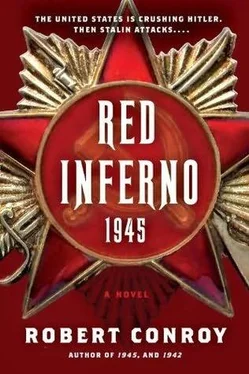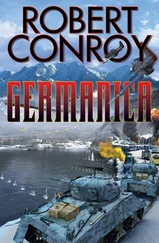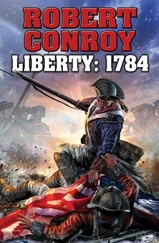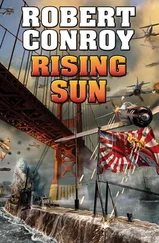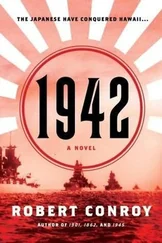Robert Conroy - Red Inferno
Здесь есть возможность читать онлайн «Robert Conroy - Red Inferno» весь текст электронной книги совершенно бесплатно (целиком полную версию без сокращений). В некоторых случаях можно слушать аудио, скачать через торрент в формате fb2 и присутствует краткое содержание. Жанр: Альтернативная история, на английском языке. Описание произведения, (предисловие) а так же отзывы посетителей доступны на портале библиотеки ЛибКат.
- Название:Red Inferno
- Автор:
- Жанр:
- Год:неизвестен
- ISBN:нет данных
- Рейтинг книги:4 / 5. Голосов: 1
-
Избранное:Добавить в избранное
- Отзывы:
-
Ваша оценка:
- 80
- 1
- 2
- 3
- 4
- 5
Red Inferno: краткое содержание, описание и аннотация
Предлагаем к чтению аннотацию, описание, краткое содержание или предисловие (зависит от того, что написал сам автор книги «Red Inferno»). Если вы не нашли необходимую информацию о книге — напишите в комментариях, мы постараемся отыскать её.
Red Inferno — читать онлайн бесплатно полную книгу (весь текст) целиком
Ниже представлен текст книги, разбитый по страницам. Система сохранения места последней прочитанной страницы, позволяет с удобством читать онлайн бесплатно книгу «Red Inferno», без необходимости каждый раз заново искать на чём Вы остановились. Поставьте закладку, и сможете в любой момент перейти на страницу, на которой закончили чтение.
Интервал:
Закладка:
Truman looked puzzled. “Bazarian? Isn’t he the man who was shot by one of our boys and a couple of refugees? What’s happening with them?”
“Well, sir, thanks to your decision to reconstitute the OSS, we have places for all three of them. They’ve shown a real knack for more than survival under adverse circumstances, so we’re keeping them on. In return for their secrecy, they get real good government jobs.”
“Speaking of secrecy,” Truman muttered, “I wish we could have done something about that Burke and his wife and the book they’ve written.”
“In hindsight, sir, it was definitely a mistake to discharge him so quickly. Of course, his wife’s resignation from the State Department couldn’t have been helped. On the other hand, he tells the story of his involvement in the war and the decision to use the first bomb fairly accurately. He was not a witness to the decision to drop the second on Koniev’s army or the third on the Japanese at Hiroshima that finally did end the war. I don’t think there’ll be very many repercussions. Now that we have some additional atomic bombs, perhaps it will be good to keep reminding people.”
“General, I’m not too sure anybody needs reminding. Thousands of people are still dying and much of the Weser River north to the ocean is polluted with radioactivity. The Germans are angry as hell, but that’s tough shit as far as I’m concerned. After all, they’re the ones who started the war, along with the Japs, that is. We are the world’s only nuclear power and we should be able to keep it that way for the foreseeable future.”
“I’m not concerned about the Germans’ anger, Mr. President. We saved their country and they know it. Now that the war-crimes trials are about to start, I think they just want to distract public attention from that issue.”
Truman agreed. Some of the big fish in the Nazi regime, like Goering and von Ribbentrop, were scheduled to go on trial. Doenitz and Speer, as leaders in the new German government, were exempt. This did not make Truman comfortable. At least they had gotten confirmation that Hitler and Goebbels were dead, and that Himmler had killed himself. Some others were missing, but they would be found sooner or later. Rumors had them heading for Argentina, but he’d have Marshall read the riot act to the Argentines. They’d cooperate or suffer the consequences.
They spoke of a few other things, like Churchill’s replacement as prime minister by Clement Attlee. Attlee was angry that the bombs had been based in England. Too dangerous, he’d said. They should have been told. Screw him, Truman had replied, although more diplomatically.
As he left, Marshall turned. “At least the boys are coming home. We have that to be thankful for.”
“Yes, we do,” Truman said softly.
Alone for a moment, Truman speculated on his future. Once he had been terrified at the thought of being president. Now he realized he liked it and had thrived on it. The next election would be in 1948 and he would have to begin planning and campaigning for it if he was going to be able to continue in office. He liked Marshall’s ideas and wanted desperately to see them implemented. He was especially intrigued by the plan to provide money for GIs to go to college. Slowing the return of millions of military personnel to the workforce would alleviate unemployment and possibly enable the nation to avoid another depression.
Some people told Harry Truman his political career had ended when the war did. Talk like that simply made him even more combative than he usually was. Hell, hadn’t he won the war against Germany, Japan, and now Russia? He was confident he would win in ’48 against whomever the Republicans sent against him, and now he damn well wanted to. He wanted to wipe away the stain of being what some called an accidental president. He had long ago decided he liked power and the opportunity to do something about his world.
But Marshall had been right about one thing. The boys were indeed coming home, and thank God.
The easy, rolling motion of the train was restful and allowed him to think. He had gotten on in Pittsburgh after a first train had taken him there from New York. Even though it had been jammed with passengers, his uniform and the fact that he had lost so much weight that he looked like a prison-camp refugee had prompted a middle-aged civilian to give him a seat. That he limped didn’t hurt either. He was feeling a lot better, but he still needed rest and couldn’t put weight on his leg for very long.
A couple of his fellow passengers wanted to talk about the war, but he rebuffed them politely. There was still just too much to think about. He had dreamed of this homecoming for so very long and now it was finally going to happen. But at what price? Sometimes the pain of all he had lost overwhelmed him. Not the physical pain-that was endurable and fading-but the inner pain and the memories of faces lost and voices never to be heard again.
Logan shifted his still aching leg into what he hoped would be a more comfortable position and tried to review what had happened to him. He would probably never remember the last few minutes in the bunker when, somehow, the one-armed Singer had dragged him through the collapsing ruin and then through the falling bombs to another shelter where a medic had given him first aid.
From there it was on to the field hospital where he spent the next several days in and out of delirium while doctors tried to save his shattered leg. They were successful. However, he would limp for a long while, and would probably always be able to predict rain, but the doctors said he would someday be able to walk normally, perhaps even run. He wanted to thank Singer, but Singer had been evacuated early and returned stateside. He’d gotten a letter that said Singer and his wife were together and that he and Marsha were going to start a family. Singer invited him to visit them in Boston, where Marsha had gone back to school. Jack wrote back and said sure, but in a while. Maybe a long while, since he would be finishing his own schooling as well, courtesy of a tuition payment plan developed by General Marshall.
How many friends had he lost? Bailey was dead, as were Dimitri and Crawford. Why them and not him? It would be a long time before he figured that out, if ever. The doctors and a chaplain told him it was normal to wonder about the luck of the draw and, no, he shouldn’t feel guilty about being spared. He agreed. It was just luck that he was alive, and not divine intervention. He had a life to live and would live it without guilt. At least he could begin to purge his guilt when he got over his feeling of emptiness and pain.
Jack recalled General Bradley and General Miller visiting him in the Potsdam hospital and telling him everything was going to be okay. Later, he’d gotten a Silver Star directly from Eisenhower. He wasn’t certain exactly what he had done except destroy that tank, but he accepted it. Singer got a Bronze Star for saving him.
The worst pain was the fact that Lis and Pauli had disappeared, which left him to deal with the reality that he’d made the wrong decision. America had won the battle and the war; thus, safety for them would have been in Potsdam and not on a small plane.
When he was finally shipped to England and was better able to communicate, he had tried to locate her, but to no avail. Some nice ladies at the Red Cross were helpful, but they had nothing on her or the boy. They tried to be kind and told him that there were many millions of unregistered people wandering all over Europe, and that she might yet be one of them. Or she might have gone to a refugee camp and the information had just not reached London. As yet, he was told, there was no central file of those now referred to as displaced persons.
On a hunch he had tried to find the correspondent, Ames. A sympathetic person at Reuters News Service had checked and found that Ames had never shown up either, which further devastated him.
Читать дальшеИнтервал:
Закладка:
Похожие книги на «Red Inferno»
Представляем Вашему вниманию похожие книги на «Red Inferno» списком для выбора. Мы отобрали схожую по названию и смыслу литературу в надежде предоставить читателям больше вариантов отыскать новые, интересные, ещё непрочитанные произведения.
Обсуждение, отзывы о книге «Red Inferno» и просто собственные мнения читателей. Оставьте ваши комментарии, напишите, что Вы думаете о произведении, его смысле или главных героях. Укажите что конкретно понравилось, а что нет, и почему Вы так считаете.
